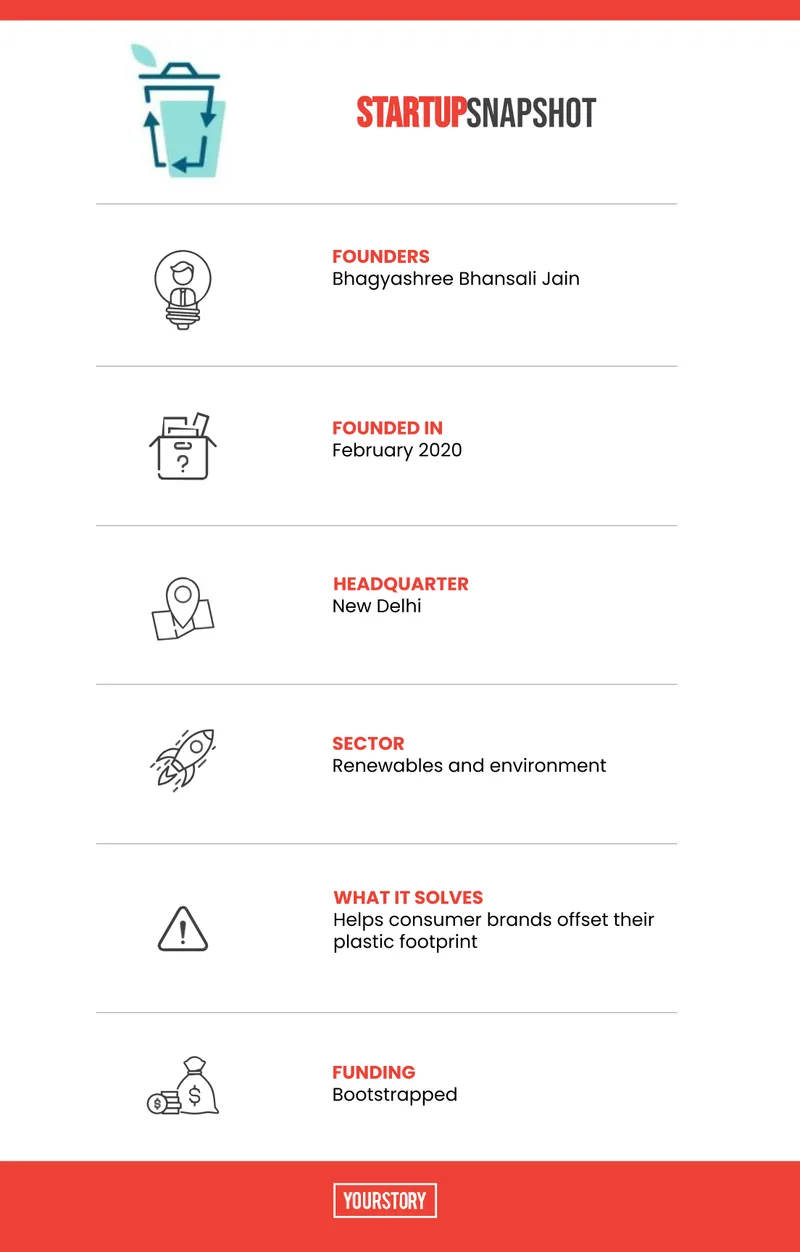How this woman entrepreneur is helping D2C brands achieve plastic neutrality
As Indian consumers increasingly become eco-conscious, Delhi-based The Disposal Company is selling plastic credit to help consumer brands offset their plastic use.
Sustainable purchasing has become the order of the day in India’s thriving direct-to-customer (D2C) market. Consumers cannot be wooed much by big brand names as many are switching to lesser-known but sustainable brands.
A report published by Capgemini Research Institute last year showed that a whopping 79 percent of consumers are changing their purchase preferences based on social responsibility, inclusiveness, or environmental impact.
Delhi-based entrepreneur Bhagyashree Bhansali Jain is helping brands become plastic neutral through her startup The Disposal Company. Founded in February 2020, it helps companies offset plastic they have created and used by recovering or removing an equivalent amount from the environment and recycling it. The startup claims to be recycling 750 tonnes of plastic per year.
The journey
Bhagyashree has been working in the waste management industry for the past seven years. A BBA graduate from Galgotias University in Noida, she was a part of the team advising Delhi Chief Minister Arvind Kejriwal in public grievances while working with the Government of National Capital Territory of Delhi in 2014.
“My primary focus was the problem of plastic waste and that’s when I had my first brush with the field and started working with a plastic recycler to gauge more understanding on how the economics of plastic recycling and after use of plastic works,” she tells HerStory.
In 2020, she moved to Rajasthan after her marriage. While looking for job opportunities in the waste management field, she realised there was not a single authorised recycler in the state and established an authorised recycling unit.
“I also started consulting the state’s environment minister and the city’s pollution control board to understand how I can manage the city’s waste better in my personal capacity,” she says.
But when the COVID-19 pandemic struck and led to a dramatic rise in consumer brands, the entrepreneur began selling plastic credit to brands.

The Disposal Company's recycling unit in Jaipur, Rajasthan
How it works
While high-value plastic waste has financial value and is picked up by rag pickers and other informal workers in the recycling industry, low-value plastic waste – often used in packaging by most consumer brands – end up in landfills. With The Disposal Company, Bhagyashree decided to focus on recycling such low-value plastic waste.
Once a brand is signed on as a client, the startup conducts a one-time waste audit to assess their plastic footprint, the types of plastics used, and the corresponding quantity. The Disposal Company then calculates their dynamic plastic footprint based on their month on month sale of products.
Through its network of authorised recycler partners and about 400 ragpickers and waste aggregators across India, the startup gives them a target amount of low-value plastic waste from municipal waste and landfills, which are then cleaned, segregated, and recycled.
“At the end of this process, a certification is generated stating the brand's net plastic footprint has now been set to zero,” she explains.
Started with an initial investment of Rs 75 lakh to set up the recycling unit, the startup charges Rs 25 per kg of plastic waste offset. Bootstrapped so far, the startup has been selected as part of the Accenture Sustainability accelerator programme where they will get a seed fund of Rs 60 lakh.

Catching the eco-friendly trend
Bhagyashree says the B2B model of selling plastic credit is relatively new in India with little to no competition at all besides global players like US-based Repurpose Global.
Before launching its B2B solutions, she prioritised the model that would be feasible in the long-term, especially as it was pitching to budding startups.
Catering to more than 30 consumer brands at the moment, Mcaffeine was among the first ones to adopt a plastic-neutral strategy. The startup was also approached by early-stage fund Fireside Ventures, which wants to make it a norm for its portfolio of consumer brands to go plastic neutral.
She says, many other VC firms are interested to improve their environmental, social, and governance (ESG) ratings.
Word-of-mouth became a key factor of acquiring more customers. “There was a clear snowball effect. Once a bigger brand goes plastic neutral, it starts becoming industry standard because then all the consumers highlight the fact that if it's doable for certain brands, why are you not doing it? And all brands have that image to build,” she adds.
Moving ahead, it hopes to incorporate a reward system for the customers of its B2B clients who opt to pay a few extra bucks for plastic neutrality.
Further, as plastic credit is a geography agnostic solution, the startup hopes to expand further into the global market and is now developing an automated process for a more seamless audit and onboarding experience.
Edited by Megha Reddy









